- Home
- Howard Jacobson
The Dog's Last Walk Page 3
The Dog's Last Walk Read online
Page 3
I have no memory of banging my head against a goalpost, but then the memory of banging one’s head against a goalpost is precisely the sort of memory that banging one’s head against a goalpost expunges. I did, however, once let seventeen goals past me when I was keeping goal for my class team, and the jeering of my fellows might have had an effect comparable to concussion. Shame devoured me anyway, even if oblivion didn’t, but why did I not swear, there and then, to make humanity pay for my humiliation? What examples urging otherwise did I attend to? What quiet voice made a coward of me?
There followed, speaking of shame, that sequence of excruciating ignominies which adolescence visits on the hypersensitive – the most productive, in the education of an assassin with a special penchant for the machete, being rejection by girls. It is a strange fact of human nature that the more fervently sentimental we are in our longing to show affection, the more urgent our need to sever people’s heads from their shoulders when that affection is not reciprocated.
Considering how often girls rejected me, it remains a mystery that I didn’t end up decapitating on what’s called an industrial scale. How was it, I must ask again, that other options presented themselves to me? Who suggested I was better off crying over Little Nell or going to the opera?
In the early life of any terrorist deserving of the name is a period working in a lowly capacity during which he shows no interest in politics and is remembered with gratitude by his bosses, who describe him as the best employee they have ever had. Here again I promised much in that I worked my socks off driving a delivery van for Wall’s ice cream when I was eighteen and was careful to say nothing about wanting to blow the world to smithereens when I met my fellow drivers at the pie and mash shop in Bolton. Yet for all these advantages I got no nearer to fanaticism than reading English literature at Cambridge.
Here at last, you would have thought, was my opportunity. My moral tutor alienated me by thinking that if my name wasn’t Finkleburger it was Grubenstein; my supervisor harassed me by asking for an essay every week and then not liking what I wrote; I ran up bills at the buttery which I was expected to discharge; and fellow students contributed to the atmosphere of bitter disaffection in which I lived by getting better degrees than I did.
Further provoked by that subtle form of persecution known as leaving you alone, I began to walk the streets at the dead of night with my college scarf wrapped menacingly around my face. ‘Go home, sir,’ the authorities warned me, increasing my sense of beleaguerment. It would have made perfect sense to unleash destruction on that smug university town. So what, I must again ask, stopped me?
It wasn’t that there were no extremist lectures to attend. Raymond Williams made a socialist of me. C. S. Lewis a Christian apologist. F. R. Leavis an elitist. But there was still no ideology to hand sufficient to my simmering resentment. Suited by nature and shaped by experience to be a beheader-in-chief, I was denied the opportunity to be anything of the kind by the culture of agreeable mistrust I’d encountered at home, at school, at the Wall’s ice-cream depot and at university. Put simply, I’d been ruined: brought up to doubt and question, taught never to follow blindly or believe the world would be a better place the minute I felt better in it.
And where such scepticism has not been instilled? Where education is turned into the very opposite of itself and instead of rebutting fantasy becomes fantasy’s proponent? What then? Then, reader, all bets are off. Then, until the impressionable can once again police themselves by breadth of knowledge and elasticity of mind, we must do the policing for them, acting as the intellectual consciences they don’t have.
Exposing the easily incited to dogmas of certainty and hate laced with paradisal promises is not the aim of education; teaching to think critically is. ‘Let every voice be heard’ is a fine sentiment so long as we can trust the discernment of those who listen. But right now – whatever those who believe unconditionally in free speech think – we can’t.
All sportsmen die in hotels
Last week the cricket writer Peter Roebuck died. He is said to have thrown himself out of a hotel window in South Africa. Why Peter Roebuck’s death affects me beyond the passing sadness of a shared humanity – every man’s death diminishes me, etc. – why I feel quite so diminished by it when I didn’t know the man personally or go out of my way to read his articles on cricket, mainly published in Australia where he’d chosen to live – I am unable to explain. But I cannot stop thinking about it.
Could it be because some men carry their destiny around with them, show their fatality in their faces, are cruelly marked not only by who they are but what is destined to happen to them, and if that’s so then free will is an illusion? It’s easy to be wise after the event, but didn’t Tony Hancock always look as though he was going to die before he was fifty with a bottle of vodka by his bed and amphetamines in his fist? Amy Winehouse ditto. In their beginning is their end. And the end of them is written not only on their faces but in their work – the jokes too black, the songs too self-lacerating, in Roebuck’s case the too-stern caution, not only of his batting (he captained Somerset before he turned to journalism) but of his precise, never quite animated prose, his stiffness – as it’s reported, even by those who got close enough to care for him – both on the field and off it, and the doom-laden complexion of his thoughts.
‘To a greater and lesser degree all sportsmen die in hotels,’ he wrote after the mysterious death of Bob Woolmer in Jamaica in 2007. ‘That night Woolmer went back to his room with its silences and accusing walls, an isolated figure trying to come to terms with futility.’
As a rule, sportswriters overwrite. You will get some of the best journalistic prose on the sports pages of serious newspapers, but you will also get some of the most flowery. You can bet your life that every cricket writer in the business had a go at rendering Woolmer’s last hours, but Roebuck’s account has the authenticity of someone who knows loneliness well. ‘All sportsmen die in hotels’ might have been a florid line, but it isn’t. Those ‘accusing walls’ could only have been described by a man who has felt accused by them himself. And ‘futility’ is a shocking word in that context. The sentence sets us up to expect ‘loneliness’ or ‘defeat’. ‘Futility’ doesn’t merely darken the canvas, it wipes it out. This isn’t the cliché of another suitcase in another hall; the futility encompasses sport itself and, by implication, life.
There’s a touch of this educated pessimism in all the best sportswriters and in cricket writers most of all. You go to Cambridge if you’re Atherton, Pringle or Roebuck, you go to Oxford if you’re Vic Marks, and then you give the next twenty years of your life to chasing a little ball. Futility is bound to be a word that crops up from time to time, whether the hotel walls accuse you or they don’t.
The walls clearly accused Roebuck more than other men. What they accused him of is immaterial. If you’re at all complex as a human being you will feel yourself to be guilty of every crime and omission in the book. Look at photographs of the young Roebuck and you see a shy boy uncomfortable in his skin. Shyness leaves a legacy even when it’s overcome. You know your soul to be an awkward thing and you can never forgive it for that. The reason you die in every hotel room you wind up in is that death is all you’ve ever thought you deserved. I can’t imagine Botham, with whom Roebuck famously fell out, lying in his silent hotel bed, trying to come to terms with futility.
Peter Roebuck was too lonely. I never met him but I know he was too lonely. I could tell it from the straw hat he liked to wear, tied, for God’s sake, under his chin. A close companion, of either sex, would not have let him leave the house wearing a straw hat tied under his chin. ‘You look a prat, Peter,’ he or she would have told him. And if he’d persisted they’d have left him. (Perhaps that was his intention.) The persona of his articles, too, was stiff and out of reach. Conversational his style was not. Among the reasons Australians took to him was that he told it like it was, that he had abandoned England and used the word ‘us’ to mean the Auss
ies not the Poms, but I think they also sniffed the loner in him; for all their overt gregariousness Australians understand isolation. There was some interior quality in his writing, beneath its pedantic authoritativeness a suggestion that the person he was keeping to the mark was himself.
Roebuck was charged with assault a decade ago. He caned some young men he’d been coaching at his own expense. Discipline, he had warned them, would be part of his regime. It doesn’t detract from his philanthropy that it cloaked a strange eroticism. Nobody is purely one thing. The tragedy is that eroticism, for him, had to be cloaked.
A fresh assault charge had been made the night he died. He must have felt the old, accusing futility catching up with him. It’s a desperately sad tale.
Did you see what my arm just did?
When is a Nazi salute not a Nazi salute? When somebody who isn’t a Nazi gives it. But how do you decide when somebody’s a Nazi – in heart if not in deed – if giving the Nazi salute is not to be seen as indicative? Why would anyone adopt the gestures of a political movement for which they have no sympathy?
Only scratching my ear, or words to that effect, said the footballer Nicolas Anelka, after fisting the quenelle, the inverted Nazi salute created by that unfunny French comedian Dieudonné. Some men are born Nazis, some achieve Nazism, and some have Nazism thrust upon them. Remember Dr Strangelove’s gloved salute: a man can’t always control the direction of his arm.
We exempt the Queen from our ironies. A child will copy anything she is told to copy. And we can’t know in what spirit, either, she was encouraged to do so. I gave Nazi salutes with my school friends, making a Führer moustache with a toothbrush long before Basil Fawlty. You can rest assured that we were joking. There were no Jewish Nazis where I grew up in the 1950s. In the case of those egging on the young princess, it’s less easy to be certain. Long and deep were the ties that bound British and European aristocracies to the ideology of Nazism.
Funny how class works: you turn your nose up at your own proletariat but allow yourself to be mesmerised by a little vulgarian with a terrible haircut, no dress sense and bad table manners. Jew-hating acquaints us with strange bedfellows. But what if Uncle Edward was making that very observation to amuse his nieces? Hey, kids, did you see what my arm just did…?
It’s important to remember, Dame Shirley Williams said on Newsnight last week – misremembering wildly – that in 1933, when the photograph of the royal salute was taken, Hitler’s ambitions were little known; it was still possible to admire him simply as someone who put Germans back to work – no matter that the work was building munitions factories and Dachau.
Oh, the things we don’t see when it doesn’t suit us to see them. Mein Kampf had been published in 1925. Its driving monomania could hardly have been missed by anyone who’d taken the precaution, before giving Hitler wholehearted support, to flick it open, and as early as 1920 he had entertained the National Socialist German Workers Party with descriptions of ‘the Jew as parasite’ threatening ‘the national purity’ of the German nation. Not everyone was at the Hofbräuhaus in 1920, just as not everyone was at the General Meeting of the West Midlands Area Conservative Party Centre in Birmingham to hear Enoch Powell give his ‘rivers of blood speech’, but inflammatory language has wings. Whoever wasn’t alarmed by Hitler in 1933 was already a little bit in love with his ideas.
All of which still leaves the Queen in the clear, not least because we wish her to be. We do if we are Jewish, anyway. I don’t have the slightest idea what the Queen thinks of Judaism as a faith, whether she numbers Jews among her friends, whether she prefers Roth to Updike, gets Jewish jokes, subscribes to the Jewish Chronicle, or wishes her children had found themselves nice Jewish wives and husbands. As for Israel, well, she is yet to go there. But I know she has no radical objection to Jews, and I know she is good for the Jews. How do I know? I just know.
You develop a strong instinct for smelling out your enemies when you’ve spent a long time running from them. You might not be able to say exactly what you’re looking for, but you know it when you see it. And I don’t see an enemy in the Queen. There are even moments – I am not referring to any specific face-to-face encounter – when she reminds me of the aunts and grandmothers who pinched my cheeks when I was a child, said something to me in Yiddish – ‘Have you come far, mein Kind?’ it might have been – and gave me a kopek.
It’s partly because I see something of my Central European origins in hers that I feel safe breathing the air she breathes. OK, so my ancestors studied sacred texts in muddy hovels in the Carpathians, while hers trod carpeted corridors in some Schloss in Saxe-Coburg – we are both still from somewhere else. And precisely because we are from somewhere else, we have the free minds of those grateful not to be living there any more, feel loosened in our ties, and can value the country we’ve landed in and made our own without believing its purity needs protecting from contamination. No, she won’t ever pinch my cheek, give me a kopek and whisper in my ear, ‘So how do you find the English, bubbeleh?’ But I can imagine she’d quite like to. Queen Victoria had Disraeli. Queen Elizabeth II, had things only fallen out differently, could have had me.
But anyway, the world has changed. It’s not the crowned heads of Old Europe who hate us now. If Edward the Impressionable were to raise his arm today, it wouldn’t be in fealty to the Nazis but to Hezbollah and Hamas, who openly borrow the salute for its anti-Jewish associations. ‘Hamas, Hamas, Jews to the gas,’ you will hear sung in the Netherlands and Germany. Which doesn’t stop Jeremy Corbyn being Hamas’s ‘friend’.
How defaming Jews passed from being a pastime of reactionaries to a prerequisite of the hard and not-so-hard left (where it goes by another name) is a matter for further discussion. But the Jew has always been various in his capacity to provoke: now fomenting revolution; now the bedrock of international capitalism; now promising that the meek shall inherit the earth; now grinding the dispossessed under his heel. Thus the salute of extermination passes from fascist to ‘freedom fighter’, seducing the left as it once seduced the right. Eighty years from now we might be asking whether pictures of a forgotten Labour Party leader hobnobbing with terrorists for whom the murder of Jews is a religious duty could possibly be genuine.
Darts: the last refuge of the serious
The older guy won. In the end, that’s all you need to know. The older guy knocked over the younger guy, which means the younger guy will have to wait another year. Thus is natural justice satisfied: wisdom trumps avidity, the brain outwits the body, and the younger guy has the consolation of knowing he’ll be the older guy himself one day. Tell me this doesn’t beat the Olympics. I defy you: tell me the world isn’t a better, fairer, more amusing place for having Phil ‘The Power’ Taylor, born 1960, destroy ‘Mighty’ Michael van Gerwen, born 1989.
This, for the uninitiated and benighted, is darts I’m talking about. The World Championships held at Alexandra Palace and shown on Sky TV for what seemed like most of December, with a respectful pause over Christmas. If you wonder why my first column of the new year is so often about darts, it’s because I’m usually at home over the holiday period and can’t find anything else to watch on television. What’s the alternative to darts – Downton Abbey? Call the Midwife?
Anything ‘serious’ to watch on television, I should have said. Darts purists might well contest that word ‘serious’ when it comes to the way Sky packages the World Championships. Do we really need dancing girls flashing their tushes? they will ask. Must players be escorted to the oche by over-tanned promotional girls, bow-legged in white stilettos, who blow toothy kisses to the camera when they leave the stage, under the apparent misapprehension that the event is somehow about them?
The melodramatic introductions, as though John Part vs Dave Chisnall were the equivalent to Muhammad Ali vs George Foreman, the blaring music – ‘Chase the Sun’ played whenever a player departs to take a leak – the flashing lights, the tanked-up audience shouting, ‘Oi! Oi! Oi!’, the hysterical
commentary in which every game is billed as the greatest ever played – do I call this serious? What’s wrong with the actual business – a man aiming to throw seven darts at treble 20, one at treble 19 and one at double 12 – that it must be wrapped to resemble something different?
Ah, reader, I sympathise, but you miss two things. The first is the universal capitulation of sport, along with every other form of popular diversion, to the gaudy. The Olympics were organised along the lines of a rock concert. The same tushes that are flashed at Alexandra Palace are flashed in Mumbai whenever Dhoni hits a six. Even Strictly Come Dancing, than which, in its very conception, no light entertainment could be lighter, must lighten the dancing still further with that which isn’t dancing – how-much-do-you-want-this interviews, the camp banter of pantomime judges, and Bruce Forsyth mesmerised every time there’s a standing ovation, though he of all people should know a television audience will stand and ovate a boiled egg.
The second thing you miss, you who judge the World Darts Championships harshly, is irony. In fact, the inappropriateness of the packaging works in the game’s favour. Think of how the mock-heroic satirises the overweening ambition and self-absorption of the hero. Precisely because we know they are not Ali and Foreman, and they know they are not Ali and Foreman, the darts players make their ceremonial entrance with a sort of anti-swagger, conscious of their physical limitations, their mountain bellies, their chubby arms, their unhealthy complexions, in the process flinging our banal expectations of what sportsmen should look like – indeed, what anyone on television should look like – back in our faces. Quite obviously, their sheepish expressions say, as the bulbs explode around them, quite obviously the skills we possess require regimes of dedication that are different from what you’re used to applauding. So forget the idea of falling in love with us. Just try concentrating on what we do.

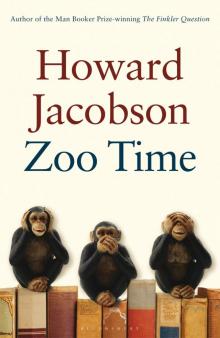 Zoo Time
Zoo Time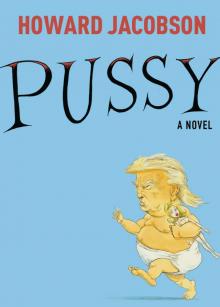 Pussy
Pussy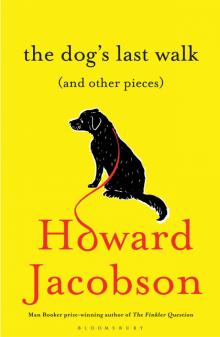 The Dog's Last Walk
The Dog's Last Walk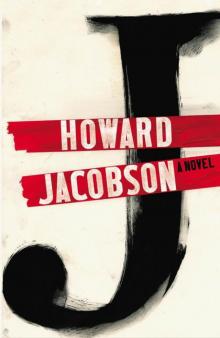 J
J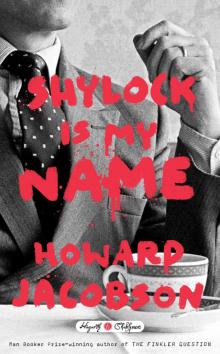 Shylock Is My Name
Shylock Is My Name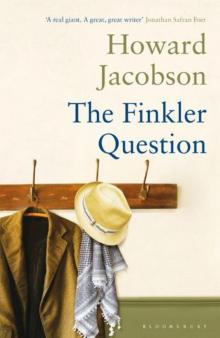 The Finkler Question
The Finkler Question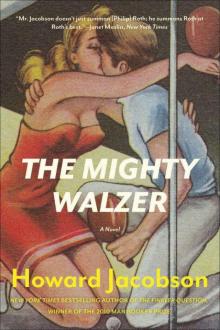 The Mighty Walzer
The Mighty Walzer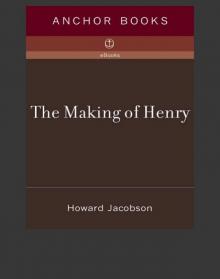 The Making of Henry
The Making of Henry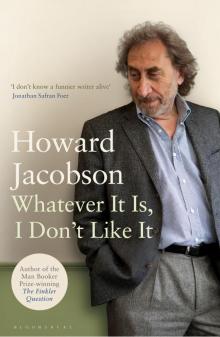 Whatever it is, I Don't Like it
Whatever it is, I Don't Like it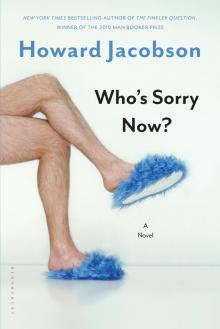 Who's Sorry Now?
Who's Sorry Now? Kalooki Nights
Kalooki Nights